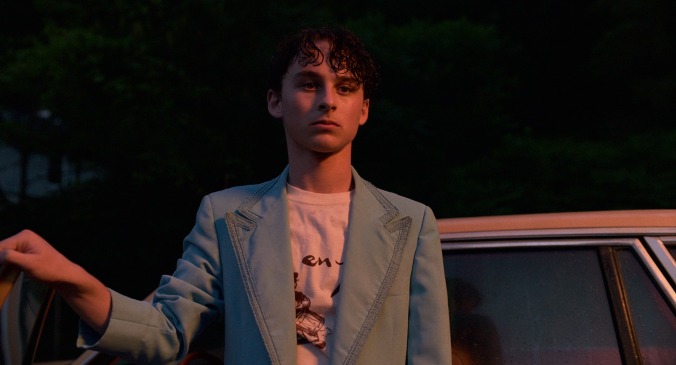Sophia Lillis gives a superpowered performance in the middling I Am Not Okay With This

There’s nothing like adding a little unhinged psychokinesis to a coming-of-age story to spice things up. If it worked for Eleven in Stranger Things, it could work for Sydney (Sophia Lillis), the 15-year-old heroine of Netflix’s I Am Not Okay With This. Sydney actually has quite a bit more in common with Stephen King’s Carrie, and not only because the show’s first season is bookended by its angst-filled protagonist drenched in blood. It is mostly to do with Sydney dealing with her raw psychokinetic energy, while navigating life without her father and helping her single mother take care of her kid brother.
In good old-fashioned “dear diary” storytelling, Sydney reveals that her counselor is forcing her to keep a journal to let out her pent-up anger, which she refers to as her “moods.” Sydney’s quips and jokes are awkwardly funny, off-putting, and candid, not unlike Ncuti Gatwa’s Eric Effiong in Sex Education, but the chip on her shoulder is hard to ignore. She reserves her kindness for her younger brother, Liam (Aidan Wojtak-Hissong), and best friend, Dina (Sofia Bryant), who frequently brings Sydney out of her shell.
Unaware of her abilities, Sydney is a cynic and reluctant to open up. While claiming to tolerate her “boring” life, she revels in the fact that the person she’s closet to is her best friend. Much of the show follows Sydney as she pushes away the people who care about her and then wonders why she is so difficult to be around. It is hard to blame her, though: Her best friend has a new douchebag of a boyfriend, her mom is too busy to help her with her problems, and the only person willing to listen to her is the quirky neighbor boy (Wyatt Oleff). Lillis’ It costar is endearing, but this Stanley distinguishes himself by forcing himself into every semi-perilous situation with the intent to help our angry protagonist. He is a likable character right off the bat, and Oleff captures the persona of a wannabe-hipster teen perfectly.
All the other people around Sydney come across as muted and miss the mark on creating an engaging environment for her to exist in, making it even harder to invest in them. In so many hero’s journeys, the hero learns she cannot always go it alone. Except, Sydney is doing just that. Rather than venting and seeking help in a healthy way, she has a tantrum or runs away. It not only places the viewer on an emotional roller coaster, but it also fails to move the plot along.
In the same way that so many superheroes manage their newfound powers, Sydney gives away little even when she feels a wave of intense aggression. As she lets out most of her angst on paper, we only get glimpses of her special powers in between her exploring her budding sexuality and fighting with her mom. With each episode, her powers and origin are revealed to be more ominous, and there are hints of potentially dangerous side effects, though her unexplainable rage and supernatural abilities are a heavy-handed metaphor for mental illness in adolescents. The series demonstrates how every teen must juggle their social life and puberty, but one can only imagine what they go through when emotional and mental instability is added into the mix.
Unlike King’s Carrie, who possessed a timid but unforgiving power, Sydney is more self-contained; even when she is tense and about to unleash whatever it is inside of her, she is not nearly as frightening as Sissy Spacek covered in pigs’ blood. Still, the slow progression of the plot hinders the story as a whole and leaves viewers hung up on the protagonist’s lack of empathy and ability to talk to people around her without a snarky comment.
Despite reveling in the angst and excess of adolescence, there is not much that sets this coming-of-age journey apart from others that have been told before. But I Am Not Okay With This does have a super power in its teen lead. Lillis’ remarkable facial expressions lend weight to the story as well as provide comedic relief. The actor is able to relay a great deal—annoyance and awkwardness—through her character’s eyes, and even when her expression is shuttered, Lillis’ brings persuasive physical comedy to her performance. The plot and story are simple, linear, and more than a little familiar, but Lillis successfully carries this first season to its gory, suspenseful ending. Without her fresh spin on how a “superhero” should behave, the show falls flat in developing anything other than a predictable path to self-acceptance.